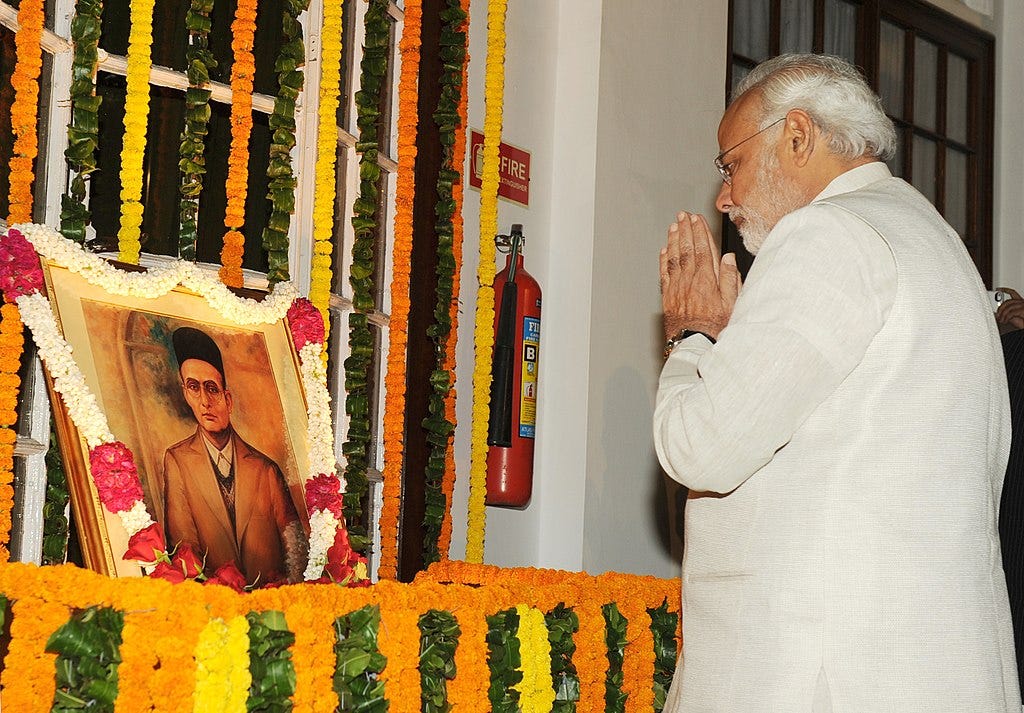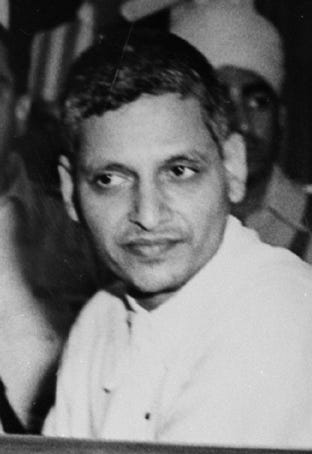To Understand Modi, You Need to Understand Savarkar
How the father of Hindutva influenced India's current Prime Minister
As India holds its general election this year, it is important to understand the political thought of Narendra Modi, the country’s incumbent Prime Minister since 2014. For many Western commentators, Modi is grouped together with Viktor Orbán, Recep Tayyip Erdoğan and Benjamin Netanyahu as democratic leaders with authoritarian and illiberal tendencies. While this characterization is typical of Western liberals’ universal aspirations, it neglects the specific historical circumstances and national ideals from which these leaders emerge. For Modi in particular, the Hindu nationalism that anchors his politics can be found in the 20th century politician and activist Vinayak Damodar Savarkar (1883 - 1966).
In the years leading up to the independence of India from the British, the Gandhi-inspired vision of India as a multicultural and multi-religious democracy came under two main lines of opposition. The first was spearheaded by Muhammad Ali Jinnah (1876 - 1948), who believed in the establishment of a separate nation for Indian Muslims. The second was Hindutva (or ‘Hindu-ness’), championed by Savarkar. It was Savarkar, not Jinnah, who first proposed the two-nation theory, when he declared that "there are two antagonistic nations, living side by side in India." Jinnah’s political philosophy would lead to the creation of the State of Pakistan, where he served as the first Governor-General. Savarkar’s, on the other hand, led to the creation of the right-wing paramilitary group Rashtriya Swayamsevak Sangh (‘National Volunteer Organisation’, also known as RSS) and the associated Bharatiya Janata Party (‘Indian People’s Party’, also known as BJP), which Prime Minister Modi is the current leader.

The RSS was also the political home to Nathuram Godse, a Hindu nationalist whose name lived in infamy as the assassin of Gandhi on January 30th, 1948. His motivation, Godse claimed, was Gandhi’s “‘weak’ accommodationist approach towards the new state of Pakistan.” Not surprisingly, he was an enthusiastic protégé and popularizer of Savarkar’s Hindutva philosophy. What is surprising is that, despite his promotion of Hindu nationalism, Savarkar was an atheist. According to historian Bipan Chandra, “[e]ven when he was the Hindu Mahasabha leader he used to publicly announce and advertise lectures on atheism, on why god is not there and why all religions are false.” Additionally, Savarkar was also a public opponent of the caste system: “The impregnable fort of caste distinction has been cursed such that while it will not fall to volleys of cannon balls, it will crumble under the onslaught of sweet balls.” Hinduism, for Savarkar, has political and national significance, rather than religious. He gives the answer to the question ‘What Is a Hindu?’ as:
The race that is born of the fusion, which on the whole is a healthy one, because gradual, of the Aryans, Kolarians, Dravidians and all those of our ancestors, whose blood we as a race inherit, is rightly called neither an Aryan, nor Kolarian, nor Dravidian—but the Hindu race; that is, that People who live as children of a common motherland, adoring a common holy land—the land that lies between the Sindhus.

This necessarily leads to his antipathy towards people of non-Hindu origins and faiths. According to Professor Amalendu Misra of Lancaster University, “in addition to blaming Muslims for all the ills that existed in India he championed the idea of complete marginalisation of Muslims.” Savarkar often talked about “Muslim carnage” or “the wrong-doings of Muslim rulers”, pointing to as his evidence “countless temples and buildings, forts and on the entire landscape of the subcontinent.” From this, he often invoked a “glorious pre-Islamic past” which Hindus “readily believed in.” He was known to question the loyalty of Indian Muslims and Christians, stressing social unity only among Hindus, Buddhists, Sikhs and Jains. The first two groups he calls ‘misfits’ for he believed that because the holy sites of the two faiths lie in the Middle East, their loyalties are going to be divided against India:
Their holyland is far off in Arabia or Palestine. Their mythology and Godmen, ideas and heroes are not the children of this soil. Consequently their names and their outlook smack of a foreign origin. Their love is divided.
Most alarmingly, Savarkar was a supporter of Nazi Germany’s policy against the Jews. He said in 1938: “Nationality did not depend so much on a common geographical area as on unity of thought, religion, language and culture. For this reason the Germans and the Jews could not be regarded as a nation.” Additionally, he compared Indian Muslims unfavorably to the German Jews: “[T]he Indian Muslims are on the whole more inclined to identify themselves and their interests with Muslims outside India than Hindus who live next door, like Jews in Germany.” Contradictorily enough, Savarkar supported the creation of the State of Israel: “If the Zionists’ dreams were realized, if Palestine became a Jewish state, it would gladden us almost as much as our Jewish friends.” A strong and independent Jewish state, he believed, would “serve to checkmate the aggressive tendencies of Moslem fanaticism in general.”
Savarkar’s Hindutva ideology remains a powerful current of Indian political thought, and now it has found its way into the Indian leadership. Modi’s most controversial action against the Muslim population was the 2019 Amendment to the Citizenship Act of 1955, which provides citizenship to religious minorities from Bangladesh, Pakistan and Afghanistan. Despite the noble intention, it has been criticized as exclusionary of Muslims in its definition of ‘religious minorities’. According to historian Mukul Kevasan, the Amendment seeks to delegitimize Muslim citizenship:
This is why Myanmar, a country bordering India, was left out of the group of nations specified in the bill and this is why Afghanistan, a country that doesn’t share a frontier with India, was included. To include Myanmar, which the logic of the bill demands, given its emphasis on giving refuge to religious minorities in India’s neighbourhood, would mean granting amnesty to Rohingyas, the most famously persecuted minority in South Asia. This would defeat the whole purpose of the bill which is to lay the foundation for a modern Inquisition aimed solely at India’s Muslims.
Thus, the legacy of V.D. Savarkar lives on. It is the job for the pluralists of India, in this upcoming election, to form a robust opposition to Modi’s increasingly anti-Muslim rule. India is not only the world’s most populous nation - it is also the world’s most populous democracy. It is time that India rise up to the noble example of Gandhi, and above the demagogic parochialism of Savarkar.




